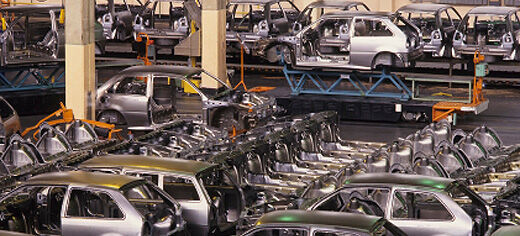
Small-car manufacturer Fiat beat its efficiency record in the 2008 recession while former high-achievers Toyota and BMW showed their worst results in 10 years, according to a new study.
Sustainable Value in Automobile Manufacturing ranks 17 of the world’s leading car makers according to how efficiently they used environmental, social and economic resources from 1999 to 2010. It is the largest sustainability study of the car manufacturing sector to date.
Using a unique calculation, researchers from the University of Leeds and Euromed Management School Marseille looked at how much profit companies generated with the resources available to them during production, and compared each to its peers.
While comparing corporate financial performance is common through the use of stock indexes such as the FTSE, this is the first major benchmarking exercise for the car manufacturing sector to include environmental and social indicators.
Fiat ranked significantly below its competitors until 2008 when it achieved above-average efficiencies for the first time, according to the findings. It beat Toyota and BMW which were the overall leaders in 1999-2007.
Toyota and BMW dropped down the rankings in 2008-2010, with BMW only recovering in 2010.
Dr Ralf Barkemeyer of the University of Leeds’ School of Earth and Environment said it was likely a combination of factors helped Fiat in 2008: restructuring in the 2000s which put the company in a better position when the recession hit, and more efficient use of environmental resources.
Dr Barkemeyer said: “Fiat cut VOC-emissions by almost 50% in 2008 compared to the previous year, most likely based on the introduction of new, more efficient technologies in some Fiat paint shops. The same to a certain extent applies to water use and waste generation: both went down in absolute terms, although sales increased slightly in 2008 compared to 2007.”
Fiat’s continued above-the-line performance in 2009 was likely influenced by the uptake of scrappage or ‘Cash for Clunkers’ schemes which gave cash rebates to people trading old cars for new. Schemes were introduced in Europe, Japan and the US mainly in 2009 to encourage the purchase of fuel-efficient cars and stimulate car sales. Many schemes required that people buy a smaller car, and many people chose a smaller car in the recession to reduce outgoings.
As a regional group, Asian car manufacturers had topped the rankings in 1999-2007 but lost their lead in 2008 when Toyota, Nissan and Honda turned in below-average results for the first time.
South Korean manufacturer Hyundai was the exception in the group, achieving the best overall results of all companies in 2008-2010.
Results for GM were dismal – it ranked below average in each year that it made data available and in 2005 achieved the worst result of any company. Its US competitor Ford managed to turn in a positive result in 2010 after below-average performances in 2001-2009.
Researchers applied the same rationale as in financial markets – that resources should only be used if the return generated is higher than the costs incurred.
Dr Barkemeyer said: “The idea that companies have to beat or at least meet the market in terms of return on capital is widely accepted in financial markets. If we are to take the notion of corporate sustainability seriously then the same should hold true for environmental and social resources.”
Prof Frank Figge from Euromed said: “Many studies compare car makers exclusively on consumption figures or models they sell. We focus on production and find huge differences in car makers’ sustainability performance.”
The Sustainable Value method developed by the researchers uses nine indicators to measure resource use: water, waste, carbon dioxide, nitrogen oxide, sulphur dioxide and volatile organic compounds (environmental); work accidents (social); and number of employees and total assets (economic).
Researchers related the quantity of resources used by a company to its earnings to establish its efficiency. They calculated a sector average and compared each company against the benchmark. Companies were scored on whether they used resources in a value-creating or value-destroying way – for example a company with high earnings and low CO2 emissions received a higher Sustainable Value score.
Researchers used the latest available data from company annual reports ending December 2010 or April 2011.
Dr Barkemeyer said accessing good quality sustainability data for the sector remained a problem.
GM did not provide data in 2008 or 2009. Other manufacturers such as Mazda, Dongfeng or Tata could not be included due to the lack of reliable data. The number of work accidents could not be considered for any of the Japanese manufacturers as the reported data did not appear credible. For example, Daihatsu did not report a single work accident for the entire year in 2004 – despite a workforce of 13,500 employees.
The report is the third update for the study period, and includes results for 2008-2010. It was funded by BMW.
Further information:
Contact University of Leeds press office on pressoffice@leeds.ac.uk
Sustainable Value in Automobile Manufacturing by Dr Ralf Barkemeyer (University of Leeds), Dr Tobias Hahn and Prof Frank Figge (Euromed Management School Marseille), Dr Andrea Liesen and Frank Muller (Sustainable Value Research Ltd.) is available at: http://www.sustainablevalue.com/automobilestudy/index.html